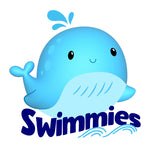Baby Swimming Lessons
Are you a parent on the lookout for an exciting activity to engage your little one? Look no further! Baby swimming lessons are a great way to introduce your baby or toddler to the wonders of water. In this guide, we will explore the baby swimming lessons, discussing why these lessons matter, when to start them, what to expect during the lessons, the different types of baby swimming lessons available, the skills your baby can learn, the equipment needed, the age groups these lessons cater to, and how long they typically last. Whether you're a first-time parent looking to introduce your little one to the joys of water or a seasoned swimmer seeking to enhance your child's swimming abilities, this guide has got you covered.
Make bath time a thrilling adventure with Swimmies' captivating collections of bath toys! Our vibrant and interactive toys turn ordinary baths into extraordinary experiences for your little ones. Shop now and add a splash of joy to every bath!
What Are Baby Swimming Lessons?
Baby swimming lessons are structured classes designed to introduce infants and toddlers to water in a safe and supportive environment. These lessons focus on developing water confidence, teaching basic water safety skills, and encouraging early swimming techniques. Conducted by trained instructors, the classes often involve parents or caregivers actively participating, providing reassurance and support to the child during the learning process. The lessons typically use gentle methods, interactive activities, and games to make the experience enjoyable, aiming to create a positive association with water from a young age.

Discover Your Perfect Swimsuit Experience With SwimmiesAt Swimmies, we're revolutionizing the way you shop for swimwear and accessories. With our carefully curated collection and unbeatable prices, we're here to make your shopping experience fun and exciting. Here's why you should choose Swimmies:
Immerse yourself in safety and style with Swimmies' thoughtfully curated collections of baby water products! From adorable swimwear to essential safety gear, we've got everything your little one needs for a perfect aquatic experience. Shop now and ensure your baby makes a splash in comfort and confidence! |
Why Do Baby Swimming Lessons Matter?
Baby swimming lessons offer numerous benefits for your little one's physical, cognitive, and emotional development. Here's why they matter:
Physical Development
Swimming helps babies develop coordination, balance, and strength. It also promotes cardiovascular fitness and improves muscle tone.
Water Safety Skills
Early exposure to swimming lessons teaches infants and toddlers vital water safety skills, such as floating and breath control. These skills can be life-saving in case of accidental water immersion.
Bonding And Confidence Building
Baby swimming lessons foster a strong bond between you and your child. The constant physical contact and support help build trust and confidence in the water.
How Are Baby Swimming Lessons Conducted?
Baby swimming lessons typically work in a structured and supportive environment where trained instructors introduce infants and toddlers to water activities. These classes focus on building water confidence, teaching basic water safety skills, and encouraging early swimming techniques. Instructors use gentle methods to help babies become familiar with water, often incorporating songs, games, and interactive activities to make the experience enjoyable. Parents or caregivers are usually actively involved, providing support and reassurance to the child during the lessons. Classes are tailored to the child's age and development level, creating a positive and safe space for them to learn essential water skills in a gradual and fun manner.
How Long Do Baby Swimming Lessons Typically Last?
The duration of baby swimming lessons can vary depending on the lesson structure and your child's age. In general, sessions usually run between 30 minutes to an hour. The length of each lesson may gradually increase as your baby grows older and becomes more comfortable in the water.
What To Expect In Baby Swimming Lessons?
Baby swimming lessons often encompass several key components to maximize your child's experience. Here's what to expect during the lessons:
- Water Introduction: Baby swimming lessons typically begin with gently introducing your little one to the sensation of water. This includes activities such as pouring water over their body, splashing, and gradually getting them comfortable with water on their face.
- Holding and Support: Instructors use specific holds and supports to ensure your baby feels secure in the water. These techniques allow your child to explore movement freely while maintaining a sense of safety.
- Floating and Kicking: As your baby becomes more familiar with water, they will learn basic floating techniques and kicking movements. These skills help improve their buoyancy and leg strength.
- Songs and Games: Lessons often incorporate engaging songs and games to make the experience enjoyable. This fun-filled environment helps build positive associations with swimming and enhances your baby's sensory development.
What Skills Can My Baby Learn In Swimming Lessons?
Swimming lessons for babies offer a range of skills that contribute to their overall development. Here are some key skills your baby can learn through swimming lessons:
- Water Confidence: Swimming lessons help your baby develop confidence and comfort in the water environment. They learn to adapt to buoyancy and engage in water play without fear.
- Breath Control: Babies learn breath control techniques, such as holding their breath underwater and blowing bubbles. These skills are important for water safety and future swimming abilities.
- Floating and Balance: Through gentle guidance and support, your baby can learn to float on their back, promoting relaxation and safety in the water.
- Kicking and Coordination: Swimming lessons teach babies basic kicking techniques that promote leg strength and coordination. These skills are foundational for further swimming development.
- Safety Skills: Baby swimming lessons often include water safety education, teaching infants and parents essential skills such as how to reach for the side of the pool and climb out.
What Equipment Is Needed For Baby Swimming Lessons?
To ensure a successful and enjoyable experience in baby swimming lessons, it's important to have the right equipment on hand. Here's a list of essential items you may need:
- Swim Diapers: Choose reusable or disposable swim diapers to keep accidents contained while allowing water to pass through.
- Swimwear: Look for comfortable and appropriate swimwear designed specifically for babies. Opt for swimwear with UV protection to safeguard their delicate skin from harmful sun rays.
- Floatation Devices: Depending on the lesson type, you may need floatation devices like swim rings or vests designed for infants and toddlers. These aids provide extra buoyancy and ensure safety during lessons.
- Towels and Robes: Have towels and robes ready to keep your baby warm and cozy, both before and after their swimming lesson.
Final Thoughts On Baby Swimming Lessons
Baby swimming lessons offer numerous benefits for your child's development and bonding experience. From enhancing physical skills to promoting water safety, these lessons provide a joyous and memorable swimming journey. To ensure your little swimmer has the right gear and products for their aquatic adventure, we recommend exploring the carefully curated selection of swimwear, floaties, and bath toys at Swimmies. With our commitment to providing unique and exciting products at amazing prices, Swimmies is the perfect destination for all your baby swimming needs.
At Swimmies, we understand the unique needs of baby swimmers. That's why we founded our online store with the mission to offer a limited but carefully selected collection of swimwear, floaties, and bath toys that perfectly suit your taste. We believe that shopping online should always be fun, and we're here to make that happen by providing a delightful shopping experience. Instead of settling for cookie-cutter stores with lackluster selections and boring gifts, trust Swimmies to provide you with the exclusive items that bring excitement back to your shopping journey.
Float into fun and safety with Swimmies' exclusive collections of baby floaties! Our specially designed floatation devices ensure your little one's water adventures are not only secure but also filled with joy. Grab yours now and let the buoyant adventures begin!
Frequently Asked Questions About Baby Swimming Lessons
What should babies wear during swimming lessons?
During swimming lessons, babies should wear comfortable swimwear designed specifically for their age range. Look for swim diapers to prevent accidents and UV-protective swimwear to shield their delicate skin from the sun's harmful rays.
Can parents join their babies in the water?
Yes, many baby swimming lessons encourage parent participation in the water. This not only enhances bonding but also provides a sense of security for the baby. However, it's essential to follow the guidelines of the specific swimming program or instructor.
Are there any health requirements for babies to participate?
Before enrolling your baby in swimming lessons, it's advisable to consult with their pediatrician. While there are generally no specific health requirements, it's important to ensure your baby is in good overall health and doesn't have any underlying medical conditions that could be exacerbated by water activities.
Are there any safety measures in place during lessons?
Baby swimming lessons prioritize safety, and instructors are trained to implement safety measures. This includes maintaining appropriate instructor-to-student ratios, conducting lessons in shallow areas, and ensuring constant supervision of babies in the water. Instructors may also provide guidance on safe holds and support techniques to ensure the baby's comfort and well-being.
What happens if a baby cries during a lesson?
Crying is a natural response for babies in a new environment. Instructors understand this and will handle it with care and patience. They may offer comforting techniques or take breaks to help calm the baby. Rest assured that negative experiences are kept to a minimum, as the goal is to create a positive and enjoyable learning environment.
Are there any potential risks associated with baby swimming lessons?
Baby swimming lessons, when conducted under proper supervision and with trained instructors, have minimal risks. However, as with any water activity, there is always a small risk of accidents or incidents. It's important to choose reputable swimming programs and follow all safety guidelines provided to mitigate any potential risks.
What should parents bring with them to the lessons?
Parents participating in baby swimming lessons need to come prepared with a few essentials. It's important to bring towels and robes for drying the baby after the lesson, along with extra clothes and either swim diapers or regular diapers, depending on the program's guidelines. Additionally, parents should carry snacks or bottles for feeding if necessary, along with any required documentation or forms requested by the swimming program. Being well-prepared ensures a smooth and enjoyable experience for both the parents and their little ones during the lessons.
Is it necessary to book lessons in advance?
Booking baby swimming lessons in advance is highly recommended, as popular programs may have limited availability. It's best to check with the swimming lesson provider regarding their booking process and any specific requirements.
Do babies need to have certain skills before starting lessons?
No specific skills are necessary for babies to start swimming lessons. The lessons are designed to gradually introduce babies to water and build their skills from there. Babies can start lessons as early as 4 to 6 months, depending on their individual readiness and the program's recommendations.
What are the different teaching methods used in baby swimming lessons?
Baby swimming lessons utilize diverse teaching approaches specifically designed for infants and toddlers. These methods often involve gentle guidance and holds to guarantee the baby's safety and comfort in the water. Instructors engage the little ones with songs, games, and interactive activities, ensuring the lessons are both enjoyable and educational. The repetition and reinforcement of fundamental swimming skills play a crucial role, enhancing learning and fostering confidence. As the baby grows, the lessons gradually progress from basic water introduction to more advanced techniques, aligning with the child's developmental milestones and swimming abilities.

